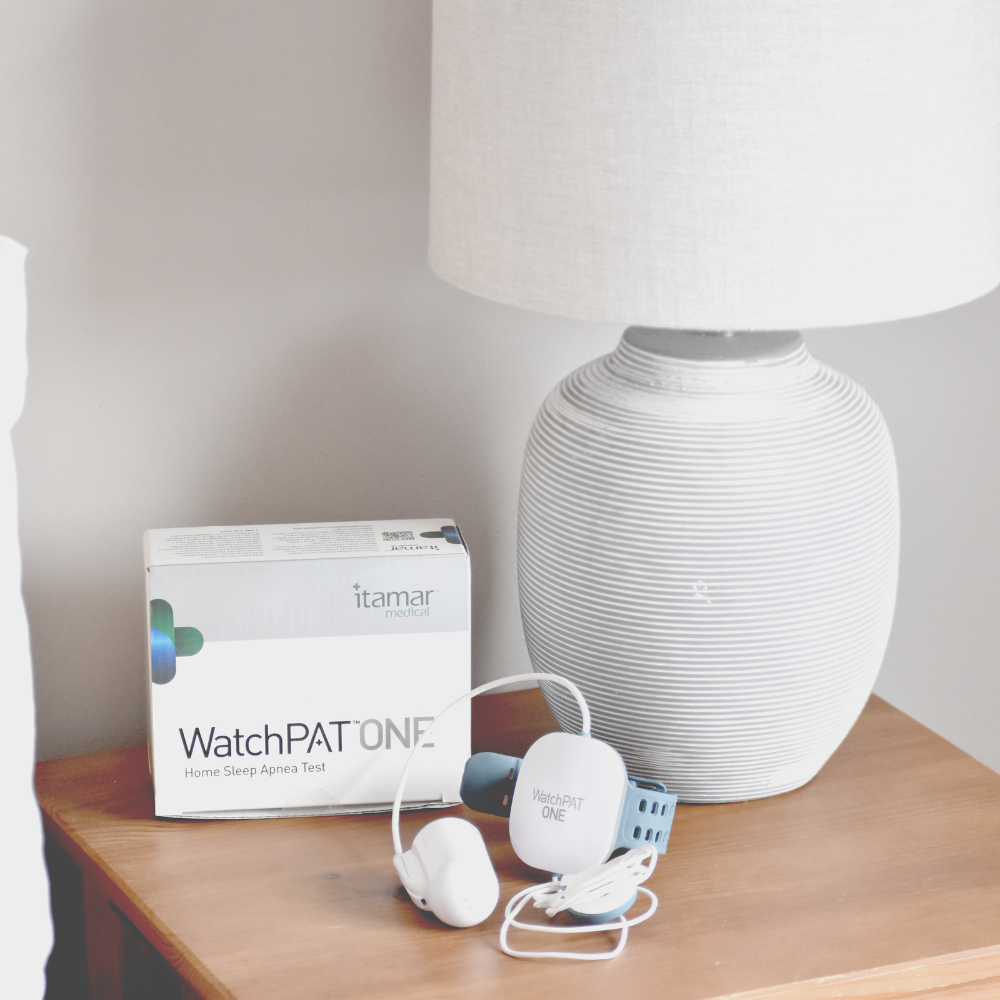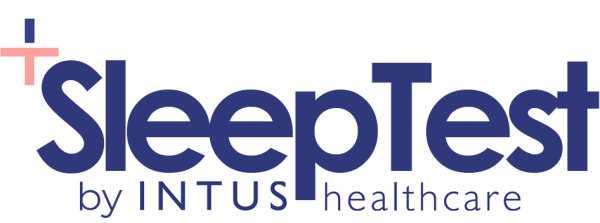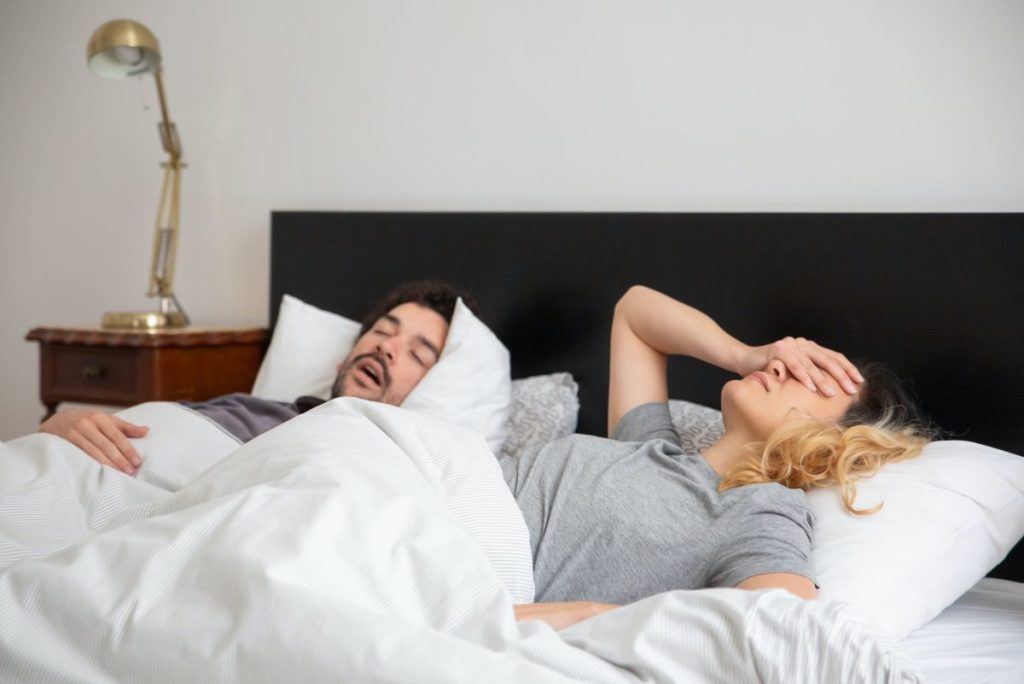Fact Checked
Intus Healthcare’s writers, customer service team, and sleep experts review and ensure this information is accurate.
Last updated on March 28th, 2025 at 01:33 pm
Are you losing sleep because of your partner’s snoring? Maybe you’re wondering why your partner stops breathing in their sleep.
Chronic snoring and breathing pauses could mean your partner has Sleep Apnoea.
Table of Contents
Signs Your Partner Has Sleep Apnoea
Obstructive Sleep Apnoea (OSA) is a common sleep condition affecting around 10 million people in the UK(1). It is characterized by repetitive episodes of complete or partial blockage of the upper airway during sleep. These blockages, known as apnoea’s or hypopneas, result in pauses in breathing and can lead to a range of health problems.
During these breathing pauses the person can wake up choking or gasping in order to re-open the airways.
There are different severities of Sleep Apnoea, positional, mild, moderate and severe. OSA severity is calculated by the Apnoea-Hypopnoea index (AHI), which indicates how many breathing pauses happen per hour during sleep.
The British Lung Foundation found up to 85% of people with OSA are undiagnosed and untreated(2).
How to tell if you have Sleep Apnoea
Here are some different symptoms and warning signs of Sleep Apnoea you might find in your partner:
How do I know if I have Sleep Apnoea?
- Choking during sleep – Choking in sleep and gasping for air is a strong indicator of OSA. The airway blockages cause people to stop breathing for a moment. Resulting in waking up choking.
- Snoring – A primary warning sign of Sleep Apnoea is snoring; not everyone who snores has OSA, but it is common.
- Related post: Snoring or Sleep Apnoea: All you need to know
- Daytime sleepiness – You may find your partner is constantly tired and exhausted. This is often a result of frequent awakenings during sleep due to breathing pauses (apnoea events), which can reduce their overall sleep duration to less than the recommended 7-9 hours.
- Brain fog – When we sleep, our bodies go through a REM cycle. As hen Sleep Apnoea causes frequent interruptions to sleep, the constant awakenings impacts the brain, causing insufficient concentration, memory loss and brain fog.
- Morning headaches – As Sleep apnoea causes frequent drops in oxygen levels during sleep, this can lead to what is known as hypoxic headaches when awakening.
- Waking with a dry mouth – If your partner snores throughout the night, breathing through the mouth can cause a dry mouth/throat.
- Nocturia –This is when someone wakes up to urinate frequently. This is a physiological reaction in their body when they stop breathing.
- Mood – You may find your partner’s mood has changed. Sleep Apnoea can affect mental health, so treating the condition is important.
- Restless Leg Syndrome (RLS): Although not directly caused by Sleep Apnoea, RLS can coexist with the condition. People with RLS experience uncomfortable sensations in their legs, leading to an urge to move them, which can disrupt sleep further in those with Sleep Apnoea.
- Decreased Libido: OSA can reduce libido and sexual dysfunction in some individuals. The sleep disturbances and hormonal changes associated with the condition may contribute to these issues.
- Insomnia: Some people with Sleep Apnoea may experience difficulty falling asleep or staying asleep, leading to insomnia-like symptoms.
- Hypertension (High Blood Pressure): Although not uncommon, hypertension can sometimes be a less recognised symptom of OSA. The repeated disruptions in breathing can cause blood pressure to rise during the night.
- Gastroesophageal Reflux Disease (GERD): There is a correlation between OSA and GERD. During apnoea episodes, pressure changes in the chest and abdomen can contribute to acid reflux and heartburn.
You can also take our free online Sleep Apnoea risk test to find out if you’re at risk of having Sleep Apnoea. If you are we recommend taking a home sleep test to determine if the condition is present.
It is important to know that weight can impact the severity of OSA; weight loss is advised for overweight people with OSA. There are also simple lifestyle changes that can improve Sleep Apnoea.
It’s important to note that these common signs and symptoms of Sleep Apnoea can vary from person to person. If you or someone you know is experiencing any of these symptoms, it is essential to seek medical evaluation and diagnosis by a healthcare professional. Early detection and appropriate treatment can help manage the condition and improve overall health and quality of life.

Home Sleep Apnoea Test
The test monitors your heart rate, snoring intensity, blood oxygen levels, body positioning, and more, providing accuracy comparable to testing used in sleep clinics for in-depth sleep analysis.
The simple-to-use test takes just one night to complete, and results are returned within two working days after completion.
Our experienced NHS-qualified sleep professionals independently analyse all studies, providing follow-up advice and support.
What Does Sleep Apnoea Sound Like?
Most people discover they have OSA because someone else hears how they breathe while they sleep. People who struggle with OSA have laboured breathing (snoring, gasping, choking, snorting) caused by the strain on their airways.
Dangers of OSA
People often ask, can you die from Sleep Apnoea?
Untreated Obstructive Sleep Apnoea can severely impact your quality of life and can cause high blood pressure, heart disease, stroke, atrial fibrillation and diabetes.
That is why it is essential to find out if you or your partner have Sleep Apnoea.
Identifying Sleep Apnoea: Take an In-Home Sleep Test
If you or your partner is experiencing some or all these symptoms, you could have Sleep Apnoea.
A quick and easy way to diagnose OSA is to take a sleep test. A sleep test device monitors snoring intensity, blood oxygen levels, body position, heart rate, body movements, and Peripheral Arterial Tone (PAT).
Once an In-Home Sleep Test is completed, a sleep clinician will analyse the data. A detailed sleep report is produced based on the results, confirming OSA or not. The results are entirely confidential.
Taking an In-Home Sleep Test will help you and your partner know what next steps to take.
What Should You Do If Your Partner Has Sleep Apnoea?
Sleep Apnoea cannot be cured, but the symptoms can be managed.
The severity of someone’s OSA will influence the required treatment:
- Continuous Positive Airway Pressure (CPAP) – CPAP therapy is the most popular and widely used Sleep Apnoea treatment. A CPAP device provides air pressure through a CPAP mask to keep the airways open. The positive airway pressure stops the airways from closing, preventing breathing pauses.
- Mandibular Advancement Device (MAD) – Suitable for those with milder cases of OSA. A MAD is a mouth guard appliance that pulls the lower jaw and tongue forward, creating more space at the back of the throat, reducing, and sometimes preventing Apnoea’s and snoring from happening. The device is also a good short-term treatment if used when on a flight or when away from mains power.
- Somnibel Positional Sleep Therapy Trainer – The device is for those with positional Sleep Apnoea. This small device sits on the forehead, vibrating when the user sleeps on their back, encouraging them to turn onto their side—stopping Apnoea’s occurring.
About Our Editorial Team
Danni is a degree-educated content writer passionate about helping those with Sleep Apnoea sleep better; she works closely with our clinical and customer care teams to ensure that each article is thoroughly researched and accurate.
Her writing aims to inform, support, and advise readers about Sleep Apnoea, helping to raise awareness and promote effective treatment options.
She has written many health-focused articles, reaching hundreds of readers annually, to help people sleep better and live healthier lives.
Lateisha King is an experienced Sleep Clinician with advanced training in polysomnography and respiratory health.
With over six years of experience, including at the prestigious Guy’s and St Thomas’ NHS Foundation Trust Hospital, she has conducted and reviewed more than 500 diagnostic sleep studies.
Her expertise in sleep science ensures that all articles align with the latest data and treatment protocols, providing readers with trustworthy and practical advice to improve their sleep health and overall well-being.
REFERENCES
- Wiggins, C. (2023, November 9). Sleep apnoea sufferers help scientists understand heart disease link. Available at: https://www.bhf.org.uk/what-we-do/news-from-the-bhf/news-archive/2023/august/sleep-apnoea-atrial-fibrillation-link. Accessed: 11.10.2024.
- British Lung Foundation. (2015). Obstructive sleep apnoea (OSA) – asthma + lung UK. Obstructive Sleep Apnoea (OSA). Available at: https://www.asthmaandlung.org.uk/sites/default/files/OSA_Toolkit_2015_BLF_0.pdf. Accessed: 11.10.2024.





